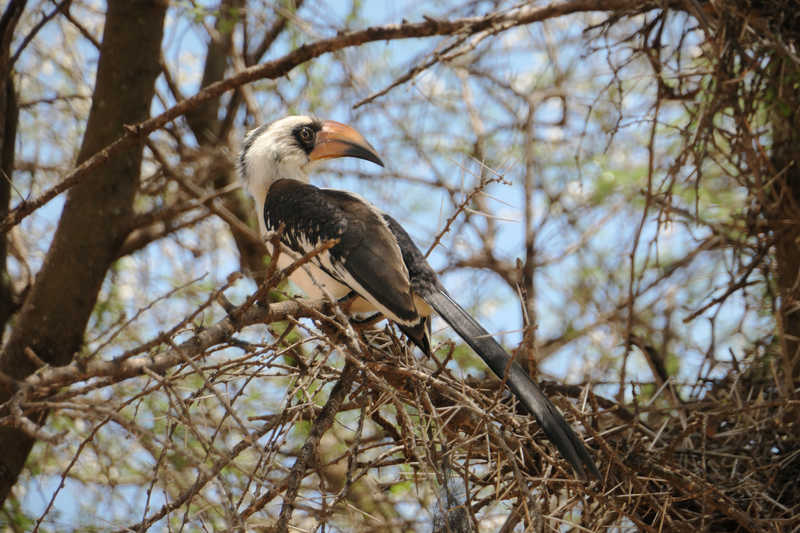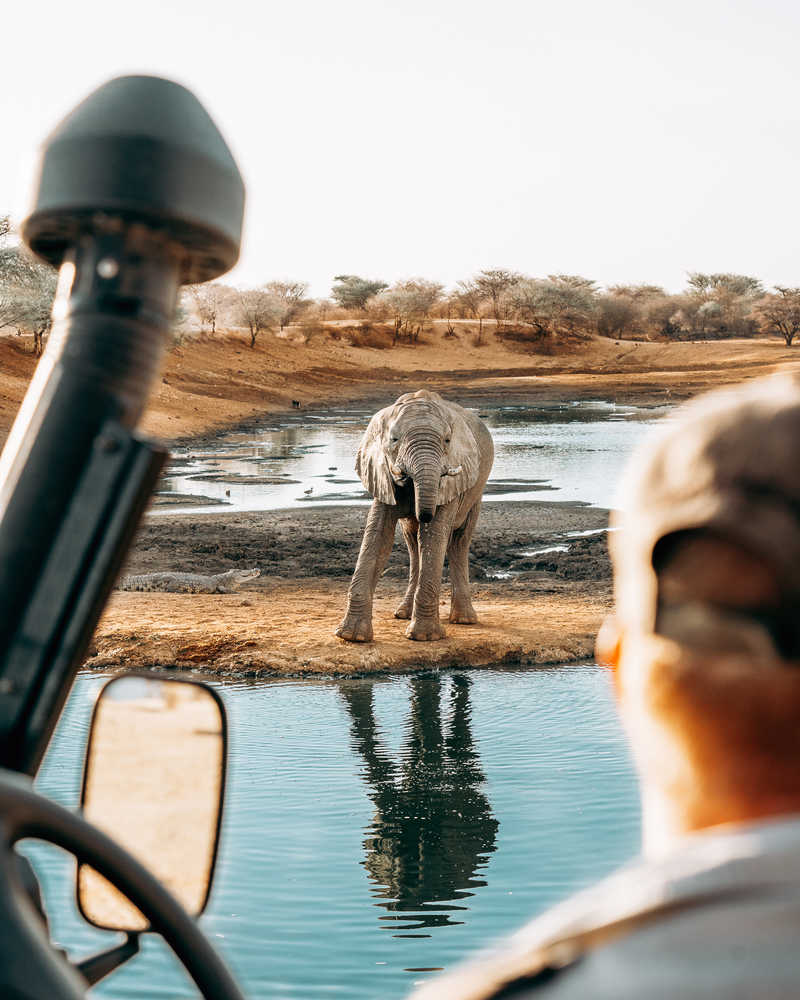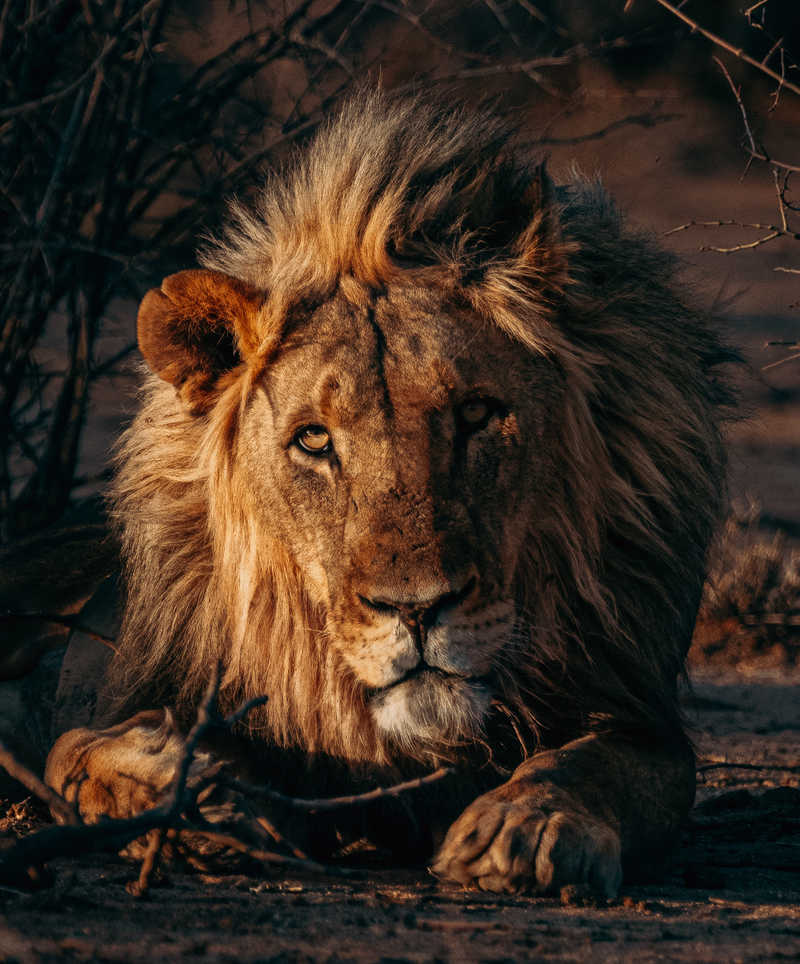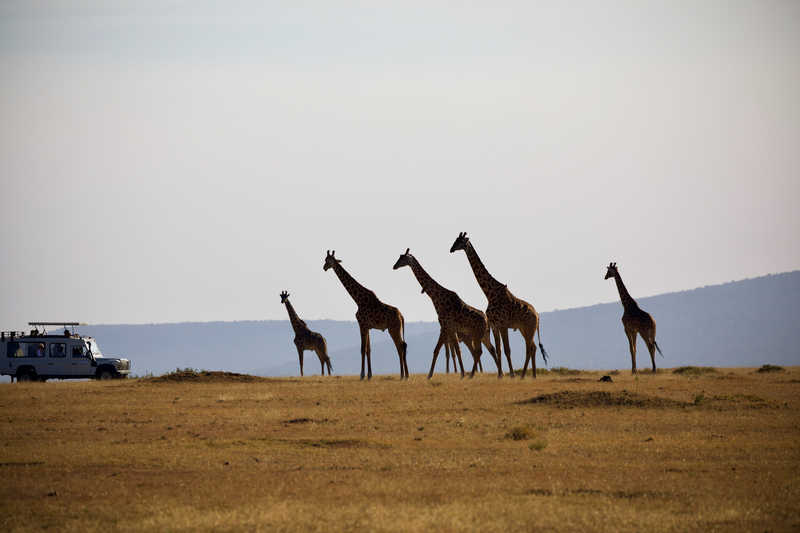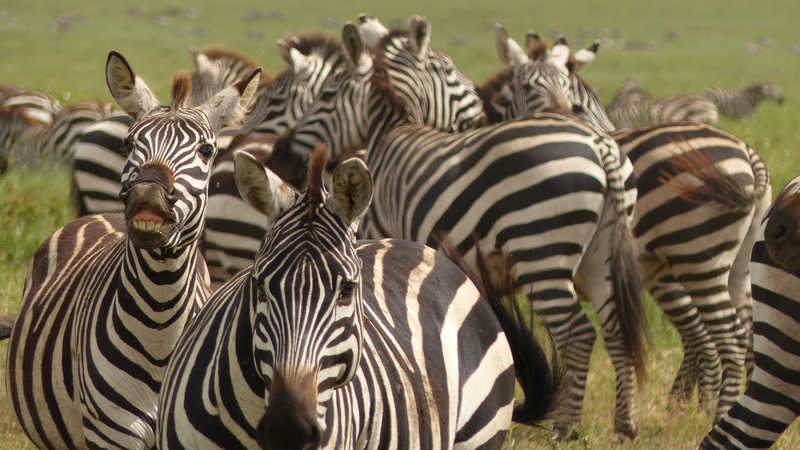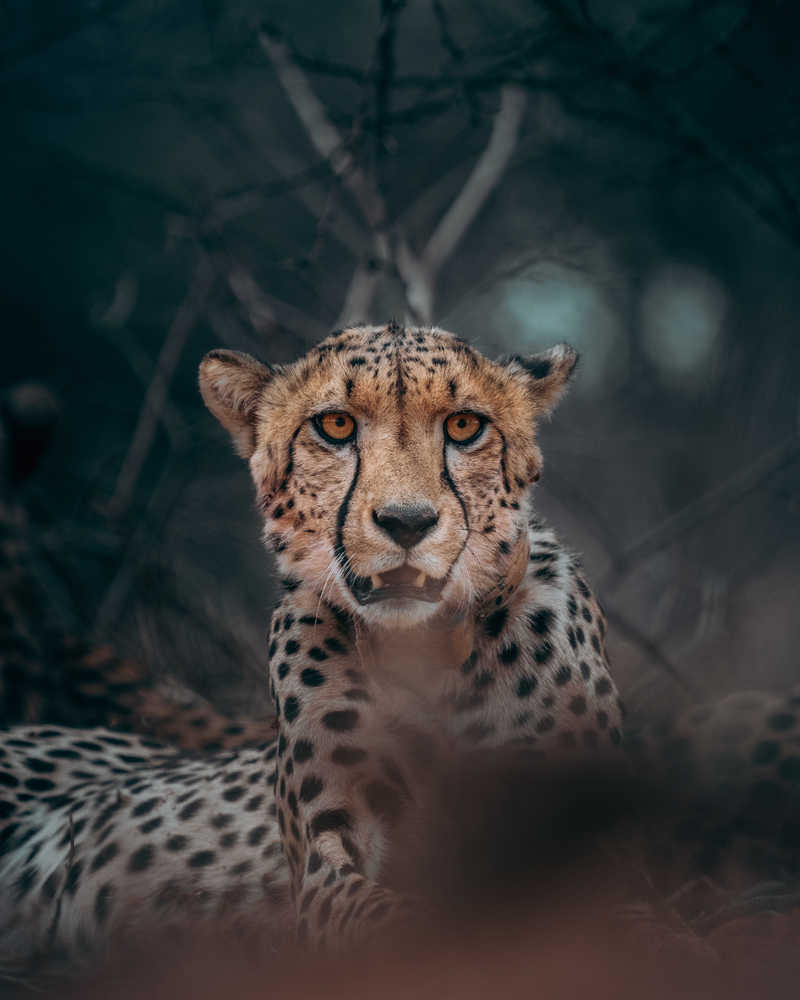Kilimanjaro Rongai Route
- Summits
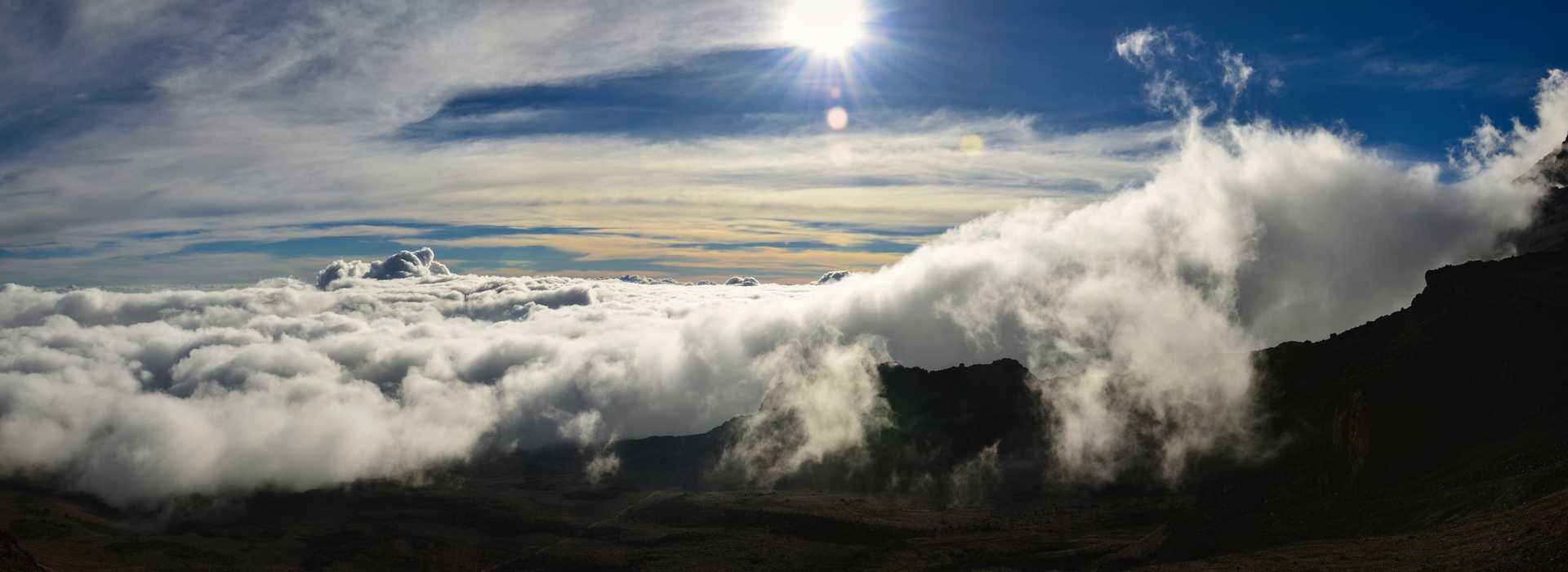
Contact
our UK team
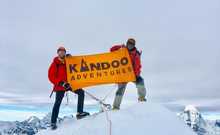
All trekkers need to organise their own flights to Kilimanjaro International Airport (JRO). From JRO we will arrange a private transfer to your hotel. That night or early the next morning you will meet your local Kandoo representative and have a full pre-climb briefing.
Transfer from your hotel to Marangu Gate for registration and then a further transfer to the Rongai trailhead (approx. 2½ hours). Our porters prepare and pack our supplies and luggage before we start our ascent through the village of Nale Moru. The small winding path crosses maize fields before climbing gently through a pine forest until we reach First Cave Camp at 2,600m altitude.
The trail continues up towards Kibo, passing Second Cave (3450m) en-route, and reaching Kikelewa Caves at 3600m. From here the views start to open up and you will see for yourself how huge a mountain Kilimanjaro really is. We camp here overnight.
A short but steep climb up grassy slopes is rewarded by superb all-round views and a tangible sense of wilderness. We leave the vegetation behind shortly before reaching the next camp at Mawenzi Tarn (4330 m), spectacularly situated in a cirque directly beneath the towering spires of Mawenzi. The afternoon will be free to rest or explore the surrounding area as an aid to acclimatisation.
We will spend a full day at and around Mawenzi Tarn as part of the acclimatisation process. There will be plenty to do, with several paths leading up the ridges and towers of Mawenzi, and our crew will help arrange short excursions to explore the area.
We cross the lunar desert of the 'Saddle' between Mawenzi and Kibo to reach Kibo Campsite (4750m) at the bottom of the Kibo crater wall. The remainder of the day is spent resting in preparation for the final ascent tomorrow.
You will be woken around 23:30 and after some tea and biscuits we will start our ascent. This is where the going really gets tough. The first section of the trail consists of a rocky path to the Hans Meyer Cave (5150m). We then zigzag up to Gilman's Point (5681m) on the crater rim. This section is very steep with much stone scree and is the most demanding section of the route. From Gilman's Point we could encounter snow all the way up to Uhuru Peak (5895m), the highest point in Africa. Weather conditions on the summit will determine how long we can spend taking photographs before we descend back to Kibo Campsite and then Horomobo Hut where we will stay overnight. Later in the evening we enjoy our last dinner on the mountain and a well-earned sleep.
After breakfast we continue our descent, passing Mandara Hut, down to the Marangu Gate. Transfer to your hotel for a well-earned shower and celebration.
After a much needed nights rest, we will bid you goodbye. If you have arranged airport transfers with us or a safari / Zanzibar trip, we will collect you in the morning for your onward journey.
BREAKFAST
Breakfast
is usually fairly hearty, and includes porridge, sausage, eggs and toast with
marmalade or jam. Of course, you’ll also have hot drinks, generally a choice of
tea, coffee or hot chocolate. Let your guide know if you are still hungry, or
even if you think you could ‘pack in a few more bites’. Our cooks always try to
provide more food than necessary to ensure everyone gets a good meal.
LUNCH
Lunch is
either packed for you, to carry in your rucksack, or we stop for a hot cooked
lunch depending on your itinerary. A typical packed lunch is a boiled egg,
sandwiches, a portion of chicken, crisps, snack bar, fresh fruit and a drink.
AFTERNOON TEA
Afternoon
Tea is served at the end of the day’s walking, once you get to camp. In
addition to tea and other hot drinks, there are plenty of peanuts, popcorn, biscuits
and snacks to help restore some of the energy you’ve just burned off.
DINNER
Dinners
are designed to be filling. They usually begin with a nice hearty soup, and then a main
course such as chicken curry, spaghetti bolognese, fresh vegetables, and plenty
of rice, pasta or potatoes, followed by a yummy dessert such as pancakes or
banana fritters with maple syrup or nutella!
We use only the very best high
altitude mountain tents, Mountain Hardwear Trango 3, to ensure you stay warm,
dry and comfortable on your Kilimanjaro climb. Please bear in mind, these are
proper mountain tents, designed to cope with extreme conditions so don’t expect
to be able to stand up and walk around inside! The dry, dusty conditions on
Kilimanjaro can play havoc with the zips and they can easily jam. Our guides
are armed with WD-40 so just ask them for assistance, rather than trying to
force the zip.
Your meals will be taken in a
separate mess tent where you will be able to sit comfortably, while you relax
and chat to your team mates and enjoy the wholesome food that our cook has
freshly prepared for you. Inside, you’ll be pleased to find a table (of course)
and a proper, comfortable chair with arms. With a full 2 metres of headroom,
even the tallest climbers will be able to stretch a bit, and move about without
hunching over. They are fully waterproof, and regularly withstand the worst
weather Kilimanjaro has to offer. A toilet tent is also provided with toilet
paper.
Kilimanjaro National Park
operates an absolutely strict limit of 15kg per porter for your main equipment
bag. This limit includes your sleeping bag, even if it is rented from us. This
is more than sufficient for your needs on the mountain. Your bag will be
weighed before you leave the hotel to start the climb and if it is overweight
you will have to take items out and leave them at the hotel. Additional porters
can be hired for an additional fee.
PLASTIC BAG BAN
On 1st
June 2019, Tanzania introduced a ban on all single-use plastic bags.
Please support this fight against plastic by using more sustainable
alternatives in your luggage, such as packing cubes and dry bags. Passengers
with plastic bags in their luggage may be asked to surrender them on arrival at
the airport.
The
zip-lock bags required to carry liquids and toiletries in cabin baggage on
airplanes will still be permitted.
It is a requirement of joining any of our climbs that you attend a
pre-climb briefing the day before the climb begins. This gives our guide team
the opportunity to review the plans for the climb with you, make sure you have
all the right gear, arrange any equipment rental and answer any questions you
may have. Please ensure that you bring your passport to the briefing, as your
guide will need to collate the details required for registration at the park
gate. We will also carry out a pre-climb health check which must be completed
before you trek to high altitude. The briefing in Moshi is held at 4pm the evening before
the climb begins, and we strongly recommend that you book a flight that arrives
in Kilimanjaro in time for you to attend the briefing.
If you should arrive on a late evening flight or have been on safari,
then you will need to get up early so the guide can brief you in the morning
before you set off for the mountain.
Please take some time to read our Kilimanjaro Training Guide which is full of helpful tips on how to get physically prepared for your climb.
Please note that not all hotels can accept
card payments so you may need to use an ATM to access funds.
You may
also find on your summit attempt that some of the porters accompany the group
to provide additional assistance. This is an additional task that they carry
out in order to support you having the best chance of reaching the summit.
Please show your appreciation for any help you receive by tipping these porters
directly. We would suggest an extra tip of $20.
The
tipping announcement will take place on the last night on the mountain when all
the crew will gather together to celebrate with you. One representative from
your group should say a few words of thanks, which will be translated by the
lead guide into kiSwahili.
Due to
recent thefts on Kilimanjaro, we no longer advise our clients to carry cash
with them during the climb, so the actual tip money will be presented when you
return to your hotel. Your group will be supplied with envelopes to assist with
the distribution of tips – one envelope for the porters and a separate envelope
that you can use to tip your lead guide, assistant guides and cook. Three
porter representatives will come to the hotel to accept the tip envelope on
behalf of all the porters, and they will distribute the money themselves.
RENTAL EQUIPMENT
If you’ve
decided to rent gear, then below is a list of equipment available. Just let our
team know what you’d like to hire at your Pre-Climb Briefing. All payments can be made locally in Tanzanian Shillings or by card.
These items must be packed in
your main equipment bag. They should not be attached to the outside, as we are
not responsible if items fall off when the bags are being carried up the
mountain. The sleeping bags weigh approximately 2.6kg each.
UPPER
BODY
LEGS
·
Leggings
– thermal or fleece base layer (x1)
·
Trekking
trousers – light or medium weight (x2) – convertible trousers work well
·
Waterproof
hard shell trousers – ski pants work fine
·
Gaiters –
optional but it can be muddy in the rainforest and dusty higher up
FEET
OTHER ACCESSORIES
| From | To | Price | Availability | Book | Enquire |
|---|---|---|---|---|---|
| 28/02/2026 | 08/03/2026 | £2,299 $2,855 |
Available
|
Book now | Enquire now |
| 21/03/2026 | 29/03/2026 | £2,299 $2,855 |
Available
|
Book now | Enquire now |
| 06/06/2026 | 14/06/2026 | £2,299 $2,855 |
Available
|
Book now | Enquire now |
| 04/07/2026 | 12/07/2026 | £2,299 $2,855 |
Available
|
Book now | Enquire now |
| 01/08/2026 | 09/08/2026 | £2,299 $2,855 |
Available
|
Book now | Enquire now |
| 05/09/2026 | 13/09/2026 | £2,299 $2,855 |
Available
|
Book now | Enquire now |
| 26/09/2026 | 04/10/2026 | £2,299 $2,855 |
Available
|
Book now | Enquire now |
| 17/10/2026 | 25/10/2026 | £2,299 $2,855 |
Available
|
Book now | Enquire now |
| 12/12/2026 | 20/12/2026 | £2,299 $2,855 |
Available
|
Book now | Enquire now |
| 23/01/2027 | 31/01/2027 | £2,349 $2,999 |
Available
|
Book now | Enquire now |
| 06/02/2027 | 14/02/2027 | £2,349 $2,999 |
Available
|
Book now | Enquire now |
| 27/02/2027 | 07/03/2027 | £2,349 $2,999 |
Available
|
Book now | Enquire now |
| 20/03/2027 | 28/03/2027 | £2,349 $2,999 |
Available
|
Book now | Enquire now |
| 05/06/2027 | 13/06/2027 | £2,349 $2,999 |
Available
|
Book now | Enquire now |
| 03/07/2027 | 11/07/2027 | £2,349 $2,999 |
Available
|
Book now | Enquire now |
| 31/07/2027 | 08/08/2027 | £2,349 $2,999 |
Available
|
Book now | Enquire now |
| 04/09/2027 | 12/09/2027 | £2,349 $2,999 |
Available
|
Book now | Enquire now |
| 25/09/2027 | 03/10/2027 | £2,349 $2,999 |
Available
|
Book now | Enquire now |
| 09/10/2027 | 17/10/2027 | £2,349 $2,999 |
Available
|
Book now | Enquire now |
| 11/12/2027 | 19/12/2027 | £2,349 $2,999 |
Available
|
Book now | Enquire now |
Want to ask us a question or book a private trip? Don't hesitate to contact us!
Contact us